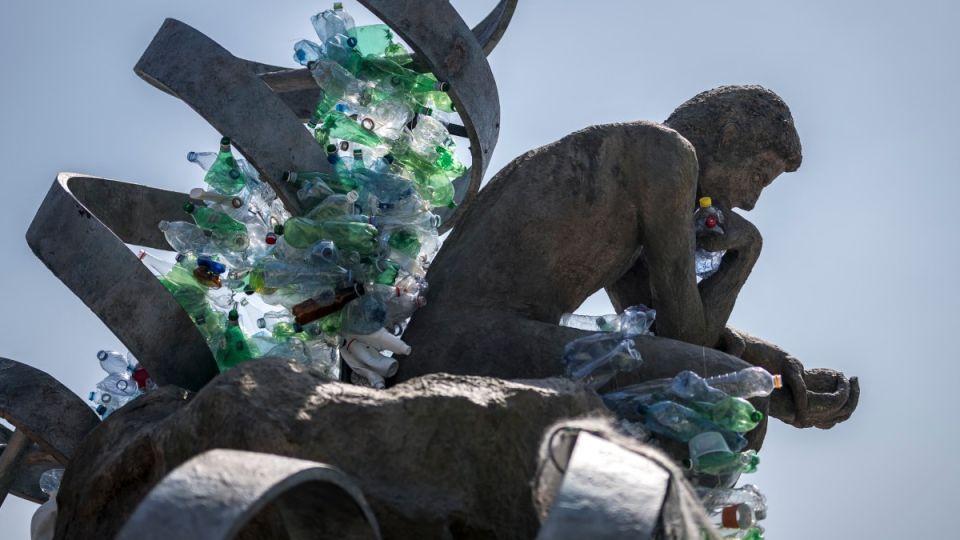August 15, 2025
JAKARTA – Environmentalists have urged the Indonesian delegation to reject the latest draft for a global agreement to eliminate plastic pollution, warning the country to take a bolder stance in the last hours of negotiations that have been stalled by split stances among participating countries.
Negotiators at the session of the United Nations Environment Programme’s (UNEP) Intergovernmental Negotiating Committee (INC) in Geneva, Switzerland entered the final day of the negotiation to produce an internationally legally binding treaty that would dictate how countries should work to tackle global plastic pollution.
The talks followed up on those held in South Korea last year, which failed to produce a treaty, and marked the sixth round of negotiations for the agreement in the past 2.5 years.
But the Geneva negotiations reached another deadlock on Wednesday, when chair Luis Vayas Valdivieso presented a draft text aimed to accommodate the two factions in the talks.
One side is a cluster of mostly oil-producing states, such as Saudi Arabia and Russia, which want the treaty to focus primarily on waste management. The other side is a growing faction of the “high-ambition coalition”, such as the European Union, as well as many African and small island countries, that want more fundamental action, including reining in plastic production and phasing out toxic chemicals.
But the 31-article draft was rejected by both factions and outside observers, such as environmentalists, who said the draft text had lost sight of the treaty’s key objective promised years ago.
The Alliance of Zero Waste Indonesia (AZWI), which includes environmental groups such as Greenpeace Indonesia and Nexus3 Foundation, slammed the draft for failing to provide a binding global obligation to reduce plastic production.
The alliance noted how the treaty draft focused more on waste management, instead of pushing to curb production of new plastics and chemicals used to make the polymers.
“The [Indonesian] delegation has to reject this text as a foundation of the negotiation. The latest text contains no strong ambition that could be negotiated and ignores suggestions from more than 170 countries,” said Yuyun Ismawati, a member of AZWI’s steering committee, in a statement issued on Wednesday evening.
Read also: Southeast Asian activists push for strong plastic pollution treaty
Having yet to hear from the Indonesian delegations their response to the chair’s latest draft for the treaty, the options for the Geneva talks are either to resume the talks in future rounds, or “else we seal a very weak INC agreement”, Greenpeace Indonesia zero waste campaigner Ibar Akbar told The Jakarta Post on Thursday.
The Environment Ministry’s senior advisor Erik Teguh Primiantoro, who leads Indonesia’s delegation in the Geneva talks, previously told Kompas that the country would not support restricting plastic production, as it would not align with the National Medium-Term Development Plan (RPJMN).
Environment Minister Hanif Faisol Nurofiq said on the sidelines of the negotiation that the talks should be an inclusive stage for every country. He also reasserted Indonesia’s support to seal the deal without any delay.
“Indonesia supports increased bilateral talks to accelerate an agreed multilateral treaty, through the principle of ‘no one left behind’. Our wish is that the plastic pollution issue could be solved without any delay for the sake of the environment and public welfare,” Hanif said on Wednesday, as quoted by a statement issued by the ministry.
At least 400 million tonnes of plastic are generated every year, half of which is for single-use items. Only 9 percent is actually recycled, with nearly half of all plastic waste ending up in landfills.
The plastic’s smaller particles, or microplastics, have been found all across marine animal species and within the human body through ingestion. A study published in 2024 suggested that the global level of microplastics is predicted to surge by more than 50 percent by 2040.
The study also found that Indonesians ingested around 15 grams of microplastic per month, the highest among other countries.
With ministers in Geneva for the final day of negotiations, environmental NGOs following the talks urged them to grasp the moment, AFP reported.
The World Wide Fund for Nature said the remaining hours would be “critical in turning this around”.
Read also: Plastic pollution treaty talks in disarray
“The implications of a watered-down, compromised text on people and nature around the world is immense,” and failure on Thursday “means more damage, more harm, more suffering”, it said.
Greenpeace delegation chief Graham Forbes called on ministers to “uphold the ambition they have promised” and address “the root cause: The relentless expansion of plastic production”.


